If a child has diabetes, parents can tell him or her:
If your child has diabetes, you have the obligation and responsibility to let him know some basic knowledge about diabetes. This will help him understand his disease, learn to control his blood sugar autonomously, and prevent some dangerous situations in his body. Able to learn how to deal with emergencies. This will help your child slowly learn to live peacefully with diabetes.
As a parent, you can popularize and educate your children about medical knowledge in the following ways.
What is diabetes?
Diabetes occurs when blood sugar gets too high. Blood sugar is glucose in the blood. Blood sugar is an important source of energy for children's bodies. The function of insulin is to regulate blood sugar. Insulin is synthesized by the pancreas.
The pancreas is a gland located behind the stomach (pictured). The pancreas secretes substances that aid in the digestion of food, and it also releases chemical messengers into the bloodstream. These chemical messengers are called hormones. Insulin is one of these hormones.
Insulin plays several roles to lower blood sugar. It's like a key: Insulin opens the "door" in the cell, allowing glucose to enter the cell as a source of energy.
How does food affect blood sugar?
Food contains carbohydrates, proteins and fats. These nutrients provide the body with energy. If a child consumes too much energy, it can cause blood sugar to rise and lead to the child being overweight.
When a child has diabetes, it's important to follow a meal plan that specifies appropriate intakes of calories, carbohydrates, protein, and fat. Following a meal plan can help children control blood sugar, avoid complications of diabetes, and prevent and treat hypoglycemia and hyperglycemia preventively.

